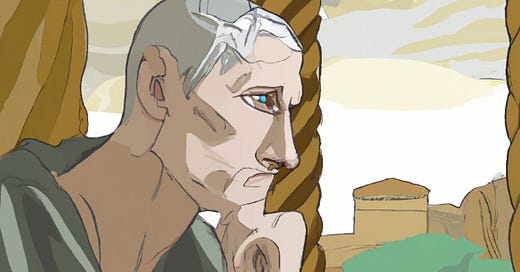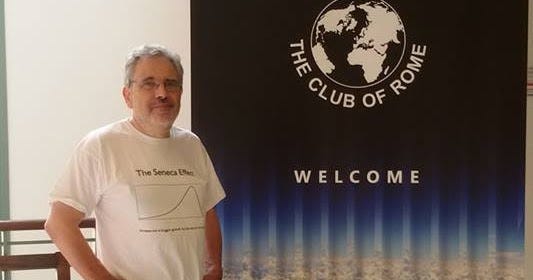The new version of the “Seneca Effect” blog on Substack is doing reasonably well, so I thought it was time to prepare a page that explains what the Seneca Effect is and what it can teach us. (image by Dall-E)
During the 1st Century AD, the Roman philosopher Lucius Annaeus Seneca observed the start of the disintegration of the Roman Empire. It was a process that would take a few more centuries to complete, but that was already evident to those who were willing to look beyond the surface of the still powerful Empire.
Seneca never explicitly mentioned the idea that the Empire was going to fall, but the sensation of impending doom pervades his writings. In a letter to a friend, he summarized the issue in a lapidary sentence.
“It would be some consolation for the feebleness of our selves and our works, if all things should perish as slowly as they come into being; but as it is, increases are of sluggish growth, but the way to ruin is rapid.”
It was the first time someone noticed in writing a typical feature of those complex systems called CAS (complex adaptive systems) that may also be defined in terms of the concept of “holobiont” in biology. These systems tend to evolve gradually (“increases are of sluggish growth), but when they reach a “tipping point,” they switch to a different state, usually involving collapse (“ruin is rapid”). It is the way the universe goes: usually smoothly but often in bumps. You can even make a mathematical model that explains how it works. The result is this nice “Seneca Curve.”
You can see this curve in many cases of calculated and observed trajectories for real-world trajectories. Several examples are listed at this link, the most worrisome kind being those climate “tipping points” that could turn Earth into an uninhabitable planet.
Seneca saw the collapse taking place around him, but he was a good Stoic, and he never had a gloomy attitude. He may not have been the greatest philosopher in history (I tend to compare it to a modern blogger!), but he was a brave man who faced his destiny with courage and dignity when Emperor Nero, his former pupil, forced him to commit suicide. Seneca understood the basic concept of Stoic philosophy that another Stoic thinker, Epictetus, wrote as:
“The chief task in life is simply this: to identify and separate matters so that I can say clearly to myself which are externals not under my control, and which have to do with the choices I actually control. Where then do I look for good and evil? Not to uncontrollable externals, but within myself to the choices that are my own…”
If you understand the Seneca Effect, you can use it as a compass to manage your life and your activities. Sometimes, collapse is unavoidable, but if you are prepared for it, you can use it as the starting point for a new beginning. Seneca himself wrote: “there is no success that’s not the result of a past failure,” a statement that I call the “Seneca Rebound.” And so we move in life, always forward, simply because we don’t have a choice.
______________________________________________
You may also buy a nice “Seneca Shirt” from Zazzle. Here, shown by Ugo Bardi








As humans flout more and more planetary boundaries, we certainly do seem destined for some kind of of collapse.
Will H. sapiens go extinct? Extremely unlikely. But there will be a sharp human population correction, accompanied by a serious loss of biodiversity. We're well past peak prosperity and the collapse will be rather rapid.
Will there be mass migration and suffering? It's already starting and will get a lot worse.
Will that trigger regional or global conflict? It could, easily. Especially as citizens' discontent will lead to discord, a hunt for simplistic solutions, and the likely rise of Trump-style autocracy - from where it's but a short journey to fascism.
I'm old, have no kids, and I'm doing what I can as a climate activist. It should be easy for me to sit here and be philosophical about all this. But I fail the Seneca test - all this does upset me, especially as hardly anyone I know has any intention of changing their lifestyle or getting political to fight for their kids' future. We're living in a bubble of denial and delusion.
i hope we have a few century's left like the roman empire ?